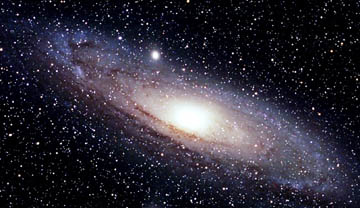
March 3, 2005 Sweet Briar, Virginia- The current British journal, Nature, features a report about a powerful and repeating burst of radio waves toward the center of our Milky Way galaxy that are unlike any other radio bursts ever monitored on Earth. The unique event took place the night of September 30 to October 1, 2002. It has taken three years for the data to be thoroughly analyzed, compared to archive data, and finally reported publicly as a unique and puzzling event in human study of our universe. The lead scientist on the Nature article is Scott Hyman, Professor of Physics at Sweet Briar College in Virginia, who for five years has been studying the Milky Way's galactic center for the Naval Research Laboratory.
Click here to subscribe and get instant access to read this report.
Click here to check your existing subscription status.
Existing members, login below:
© 1998 - 2025 by Linda Moulton Howe.
All Rights Reserved.

